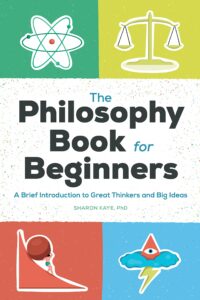In this article, we present you with a selection of the best books by Friedrich Nietzsche, the renowned 19th-century German philologist and philosopher. This selection we have made for you not only includes works of his authorship, but we have also included books that will help you get introduced to Nietzsche’s philosophy from scratch, and other works that explain the German philosopher’s thought in depth.
Next, we invite you to read a short biography of Friedrich Nietzsche so that you know who he is at a high level and can approach his philosophical thought and work.
The philosopher Friedrich Wilhelm Nietzsche was born in the small town of Röcken bei Lützen in Prussia on October 15th, 1844. After the death of his father, a Lutheran preacher named Carl Ludwig Nietzsche, Friedrich and his younger sister Elisabeth were raised by their mother, Franziska.
Nietzsche received a top-notch education, first at a private preparatory school in Naumburg and later at the prestigious Schulpforta school, where he was trained in classical subjects. After graduation, he went on to study philology – a blend of literature, linguistics, and history – at the University of Bonn for two semesters before transferring to the University of Leipzig.
Friedrich Nietzsche, the philosopher, was deeply influenced by the works of Arthur Schopenhauer. During his tenure at the University of Leipzig, he formed a close relationship with the renowned composer Richard Wagner, who he had great admiration for.
In 1869, Nietzsche was appointed as a Professor of Classical Philology at the University of Basel in Switzerland. During his time in this position, he published his first books, «The Birth of Tragedy» (1872) and «Human, All Too Human» (1878).
However, Nietzsche gradually distanced himself from classical studies and Schopenhauer’s teachings and became increasingly interested in the underlying values of modern civilization. At this point, his friendship with Wagner had declined. Due to a nervous disorder, he resigned from his post at the University of Basel in 1879.
During the following decade, Nietzsche lived a secluded life, frequently changing his place of residence, ranging from Switzerland to France and Italy, but often staying with his mother at her home in Naumburg. Despite his solitude, this period was also highly productive for Nietzsche as both a philosopher and writer.
One of his most renowned works, «Thus Spoke Zarathustra,» was published in four volumes from 1883 to 1885. He also wrote the books «Beyond Good and Evil» (1886), «The Genealogy of Morals» (1887), and «Twilight of the Idols» (1889).
These works of the 1880s marked the development of Nietzsche’s central philosophical ideas. One of the most famous of these ideas was his declaration that «God is dead,» a rejection of the significance of Christianity in contemporary life.
Additionally, Nietzsche advocated for self-perfection through the drive of creativity and the concept of the «will to power,» as well as his idea of the «superman,» an individual who strives to exist beyond the conventional boundaries of good and evil, master and slave.
Nietzsche experienced a mental breakdown in 1889 while residing in Turin, Italy. He spent the remaining years of his life in a state of mental disability. Despite much speculation, the cause of his madness remains unknown, with some attributing it to various factors such as syphilis, hereditary brain illness, a tumor, or the overuse of sedative medication.
After being admitted to a mental institution, Nietzsche was taken care of by his mother in Naumburg and his sister in Weimar, Germany. He passed away in Weimar on August 25th, 1900.
Books That Explain the Philosophy of Friedrich Nietzsche
Nietzsche For Beginners
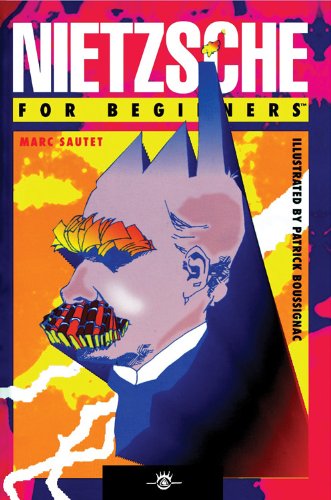
Nietzsche For Beginners is a comprehensive guide to the life and works of Friedrich Nietzsche. It provides a deep dive into the philosopher’s scandalous life, as well as a thorough understanding of the complex time period in which he lived.
The book introduces the reader to the major figures of the time, including Richard Wagner, Bismarck, Freud, and Darwin. These individuals had a significant impact on Nietzsche’s work and the author explains their influences in detail.
In addition to the major figures of the time, the book also provides an overview of the prominent philosophers that came before and shaped Nietzsche’s writing. The author clarifies the contributions of figures such as Luther, Schopenhauer, Hegel, and Kant, making the book an essential introduction to philosophy.
The most fascinating aspect of Nietzsche’s life and work are explored in the book, including his notorious three-way relationship, his theories on the Superman, Antichrist, nihilism, and Zarathustra. The book also sheds light on Nietzsche’s later misappropriation by the Nazis, making for a captivating read
Nietzsche: A Complete Introduction
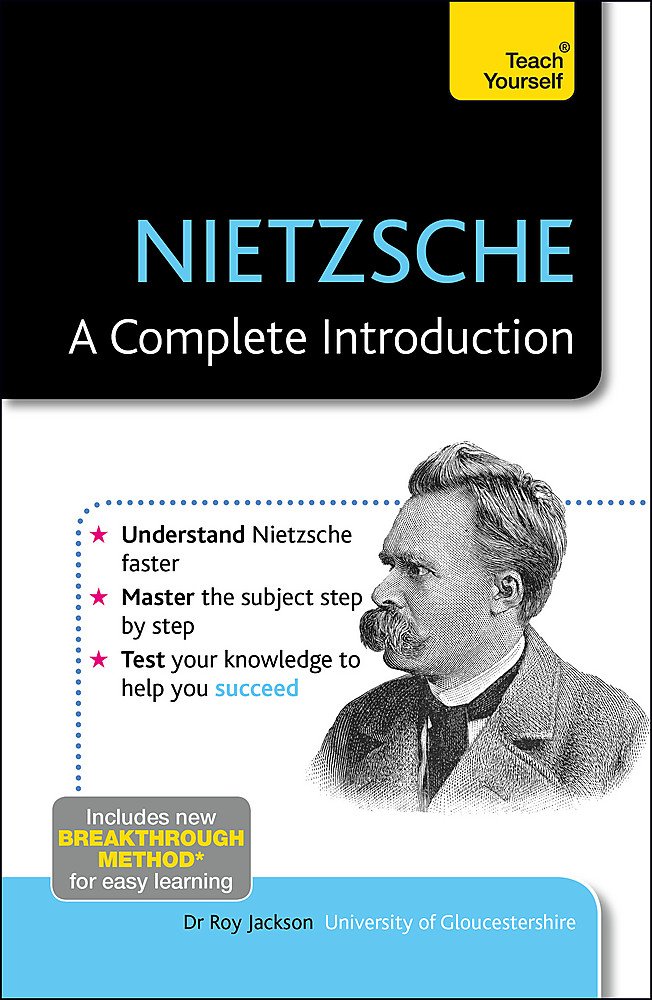
Nietzsche: A Complete Introduction, written by Dr. Roy Jackson, is a comprehensive guide to understanding Nietzsche. Dr. Jackson, who is the Course Leader in Religion, Philosophy and Ethics at the University of Gloucestershire, has designed this book to provide everything you need to succeed in studying Nietzsche. It covers the core concepts and topics that students are expected to be familiar with, explaining them in clear and concise English. Additionally, the book includes useful summaries of key books and lists of questions that may be asked in seminars or exams.
The book follows the structure commonly used in university courses on Nietzsche, with chapters exploring his life, The Birth of Tragedy, the revaluation of values, the will to power, Thus Spoke Zarathustra, truth and perspectivism, religion, politics, and Nietzsche’s lasting legacy. Whether you are a beginner or have some prior knowledge, this book is an excellent resource for understanding Nietzsche and his philosophy.
I Am Dynamite: A Life of Nietzsche
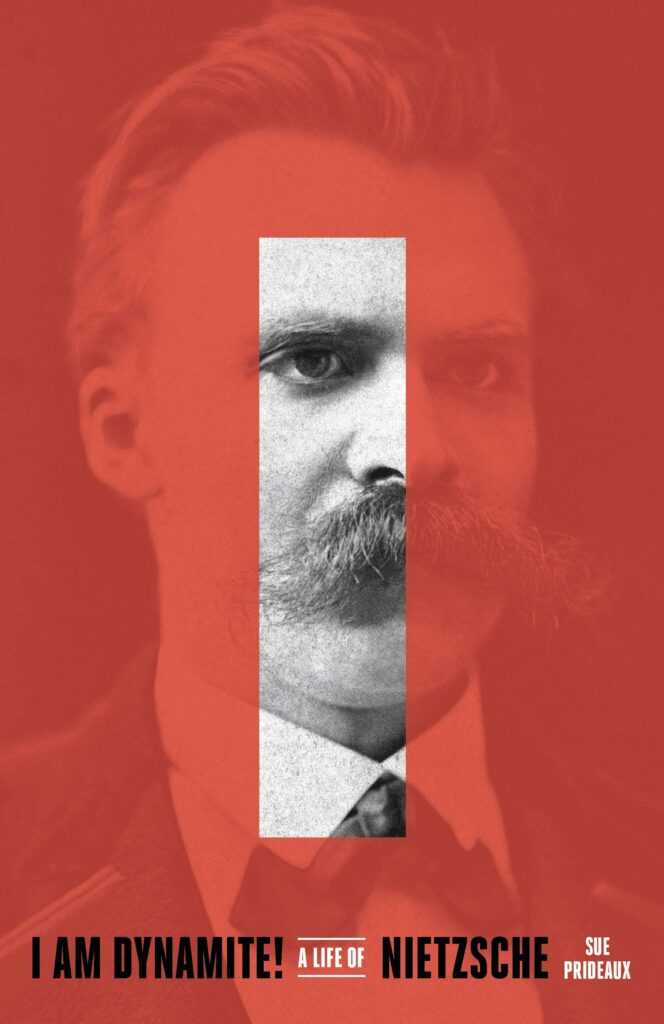
Uncovering the Life of Philosophy’s Maverick: I Am Dynamite!
Friedrich Nietzsche remains one of the most enigmatic figures in philosophy, and his ideas – such as the Übermensch, the will to power, and slave morality – have dramatically altered our perspective on the human experience. But what do most people truly know about Nietzsche beyond his distinctive mustache, scowl, and unfortunate association with nihilism and fascism? How do we categorize a thinker who was simultaneously revered by Albert Camus, Ayn Rand, Martin Buber, and Adolf Hitler?
In I Am Dynamite!, a groundbreaking new biography of Nietzsche, author Sue Prideaux delves into the life of this brilliant, eccentric, and troubled man. She sheds light on the events and individuals who shaped his life and work, taking readers on a journey from Nietzsche’s devoutly Christian childhood to his successful academic career, his solitary philosophizing in mountain retreats, and ultimately his heartbreaking descent into madness.
Prideaux also offers vivid portrayals of the people who were most significant in Nietzsche’s life, including Richard and Cosima Wagner, Lou Salomé, the fatal attraction who shattered his heart, and his sister Elizabeth, a fanatical German nationalist and anti-Semite who manipulated his writings and transformed the Nietzsche archive into a mecca for Nazi ideologues.
I Am Dynamite! is the ultimate biography for anyone seeking to comprehend one of history’s most misunderstood philosophers.
Nietzsche’s Philosophy
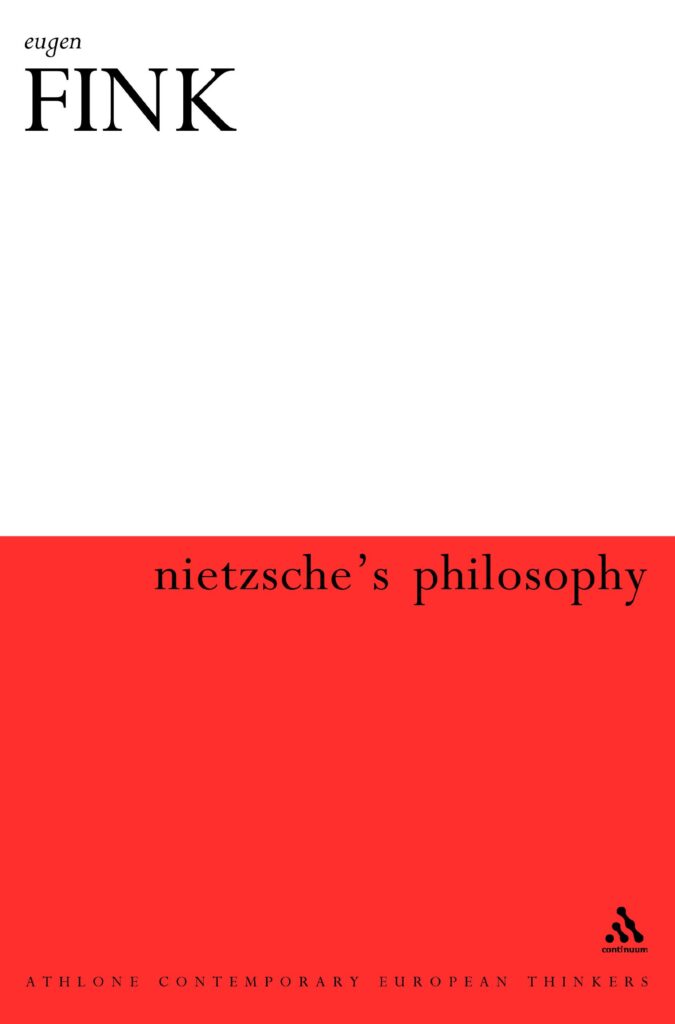
Nietzsche’s Philosophy delves into the evolution of Nietzsche’s ideas, starting from the aestheticism in The Birth of Tragedy and culminating in his late theories of the «will to power» and «eternal return». This book is influenced by the phenomenological approach of Edmund Husserl and the works of Martin Heidegger.
The author, Fink, presents the core concepts of Nietzsche’s philosophy, showcasing the philosopher’s unique perspective on thinking as a destiny, and his ultimate quest to express his ontological experience through a negative theology.
Those are the introductory books to the thought and life of Friedrich Nietzsche. We hope they have served as a guide for you to better understand this philosopher. Regardless of which one you have read, it will serve as a guide to understanding the philosophical content of his works. Next, we invite you to read the reviews of Nietzsche’s works that we have prepared for you. Let’s read them!
The Best Books by Friedrich Nietzsche in Chronological Order
The Birth of Tragedy (1872)
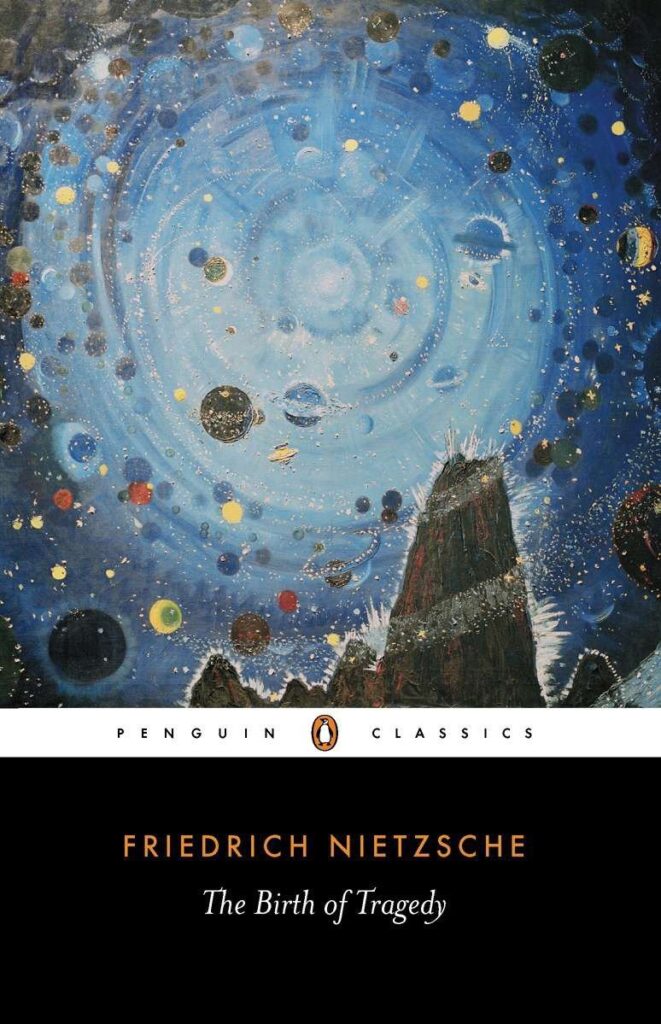
The debut publication from the writer of the renowned philosophical work, Beyond Good and Evil.
The author himself acknowledged the flaws of this youthful piece in his insightful Attempt at a Self-Criticism, which he included in the updated edition of 1886. Despite its shortcomings, the book continues to be a significant contribution to the discussion on tragedy and remains relevant to this day. It challenged the widely held views on Greek culture that persisted during the Victorian era, and its themes have since been explored by classicists, existentialists, psychoanalysts, and other scholars in the 20th century
On Truth and Lies in a Nonmoral Sense (1873)
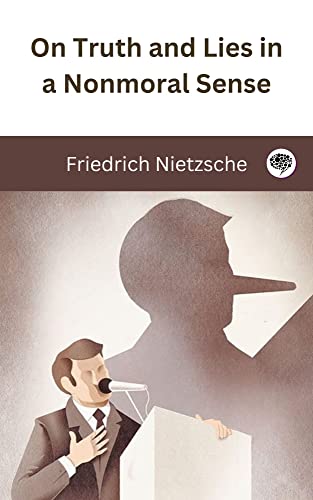
An essay written by Friedrich Nietzsche, it offers a critique of contemporary ideas surrounding truth and concepts. Nietzsche argues that concepts are metaphorical representations that do not accurately reflect reality, within the context of language formation. The ideas expressed in the essay have had a significant impact on postmodern thought, solidifying its status as a seminal work within the postmodern canon
Philosophy in the Tragic Age of the Greeks (1873)
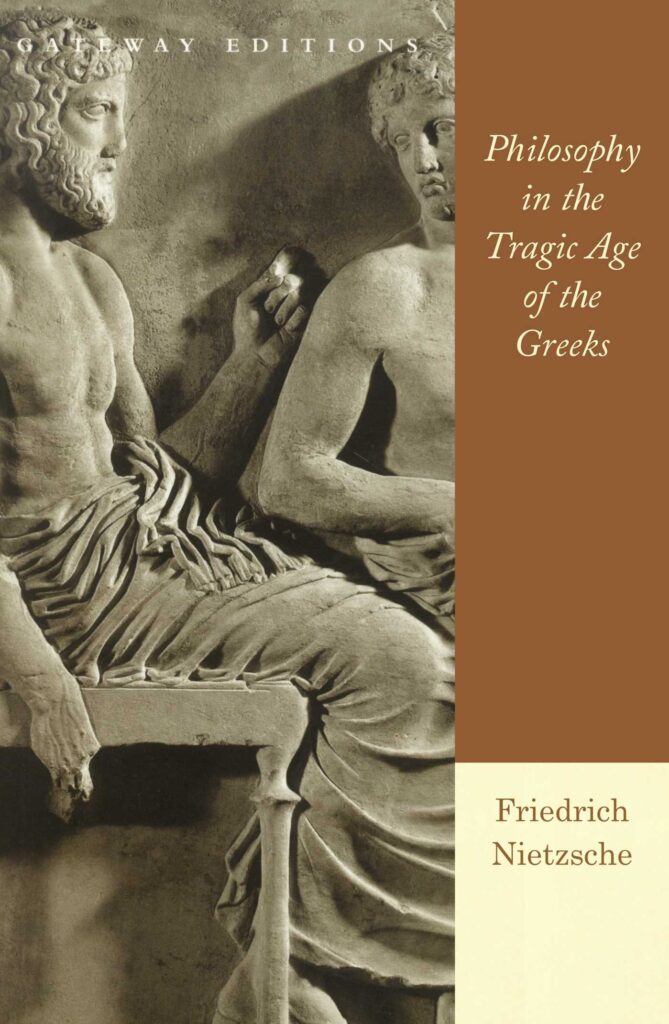
For Nietzsche, the era of Greek Tragedy was a truly tragic time. He saw the rise and peak of values that were so important to him that their subsequent decline into catastrophe (as personified by Socrates and Plato) was clearly evident, as though these events were taking place on stage.
In this work, which was not published during his lifetime but was written at the same time as his The Birth of Tragedy caused such outrage among the German academic community that it threatened his own academic career, Nietzsche’s main goal was one of education. He wanted to present the culture of the Greeks as a model for his young German contemporaries, hoping they would be inspired to create a cultural state of their own. A state that Nietzsche felt was greatly lacking.
Untimely Meditations (1876)
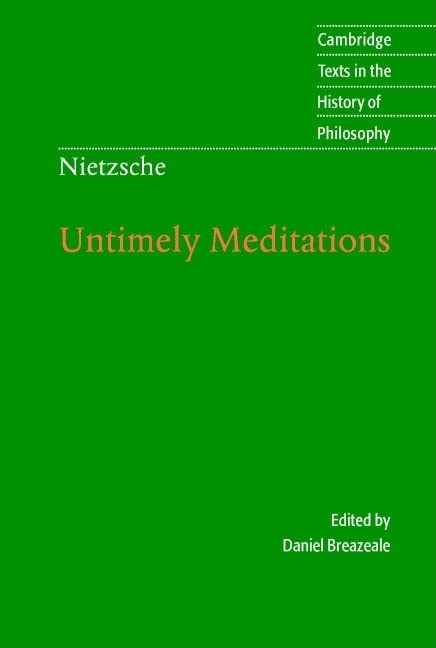
The four essays in «Untimely Meditations» serve as critical pieces in comprehending the progression of Nietzsche’s ideas. They cover a diverse range of subjects, including the distinction between common and authentic culture, methods for cultural improvement, the role of philosophy, the essence of education, and the connection between art, science, and life. This latest edition features R. J. Hollingdale’s translation of the essays, along with a fresh introduction by Daniel Breazeale, who situates them in their historical setting and highlights their significance for Nietzsche’s philosophy.
Human, All Too Human (1878)
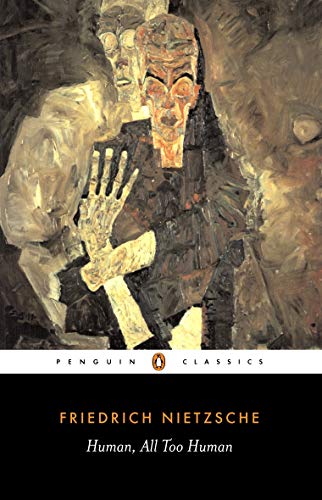
«Human, All Too Human» was written by Friedrich Nietzsche after a turning point in his life. He had ended his friendship with Richard Wagner and had to leave academic life due to poor health.
In this book, he matured as a philosopher, rejecting German romanticism and instead embracing the ideas of the French Enlightenment. The book is a collection of 638 thought-provoking aphorisms that cover a wide range of topics, from art and arrogance to boredom and passion, science and vanity, and women to youth.
This work marks the beginning of Nietzsche’s departure from traditional Christian morality and the introduction of important concepts that would later become central to his philosophy, such as the «will to power» and the need for transcendence.
Overall, «Human, All Too Human» is a defining work in Nietzsche’s life and philosophy.
Daybreak: Thoughts on the Prejudices of Morality (1881)
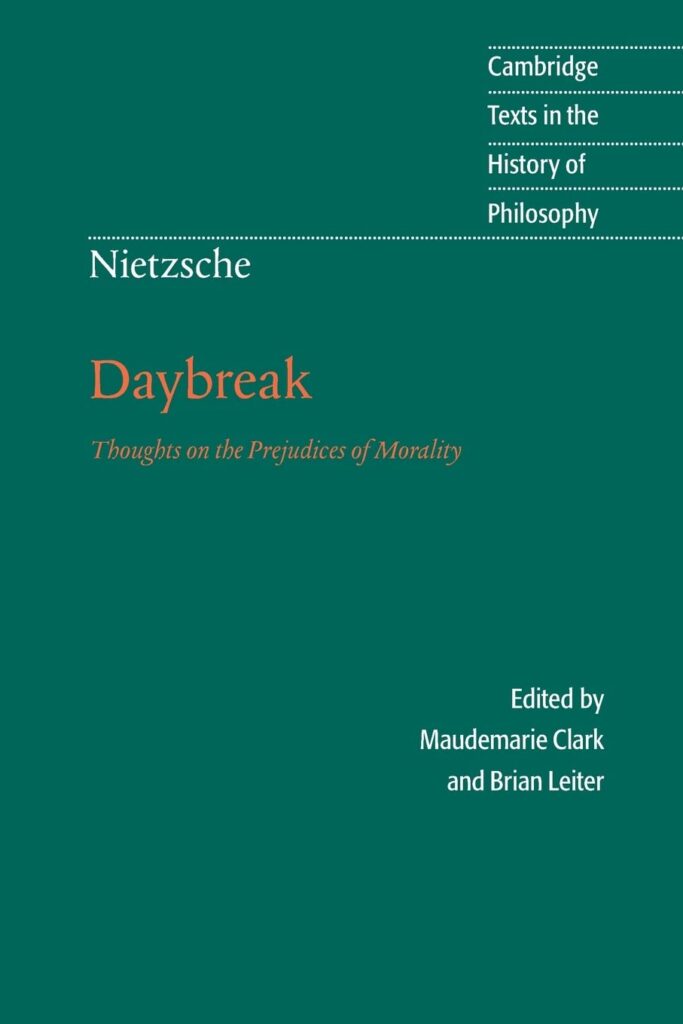
«Daybreak» is a pivotal work in Friedrich Nietzsche’s philosophy that represents the evolution of his mature thoughts and beliefs. It is an essential text for anyone looking to comprehend his critique of morality and revaluation of all values.
This volume features R. J. Hollingdale’s highly regarded translation of the work, accompanied by a new introduction. The introduction highlights the major shift in Nietzsche’s views between «Human, All Too Human» and «Daybreak» and how this change foreshadows the central themes explored in his later, more widely known works such as «On the Genealogy of Morality».
To provide additional context and support for readers, the edition includes a chronology of events, notes, and a guide to further reading.
The Gay Science (1882)

«The Gay Science» is a remarkable work written by Friedrich Nietzsche during a time when he was at the height of his intellectual abilities. This book is considered by Nietzsche himself to be one of his most personal works and provides a comprehensive and sophisticated examination of the philosophical themes and ideas that were central to his thought and have had a lasting impact on subsequent philosophers.
This edition is presented in a new translation by Josefine Nauckhoff and includes an introduction by Bernard Williams. The introduction provides readers with a deeper understanding of the main themes of the book and the continued significance of these themes in modern philosophy.
Overall, The Gay Science -also known as The Joyous Science- is a must-read for anyone interested in Nietzsche’s philosophy and its impact on modern thought. Through its liberating journey of discovery, this book offers readers an exhilarating doctrine of self-emancipation and the concept of eternal recurrence. In this work, Nietzsche is at his most personal and affirmative, presenting a book full of «exuberance, restlessness, contrariety, and April showers.» With its unique voice, playful combination of poetry and prose, and invigorating quest for self-emancipation, «The Joyous Science» is a literary tour de force and one of Nietzsche’s best works.
Thus Spoke Zarathustra (1883)
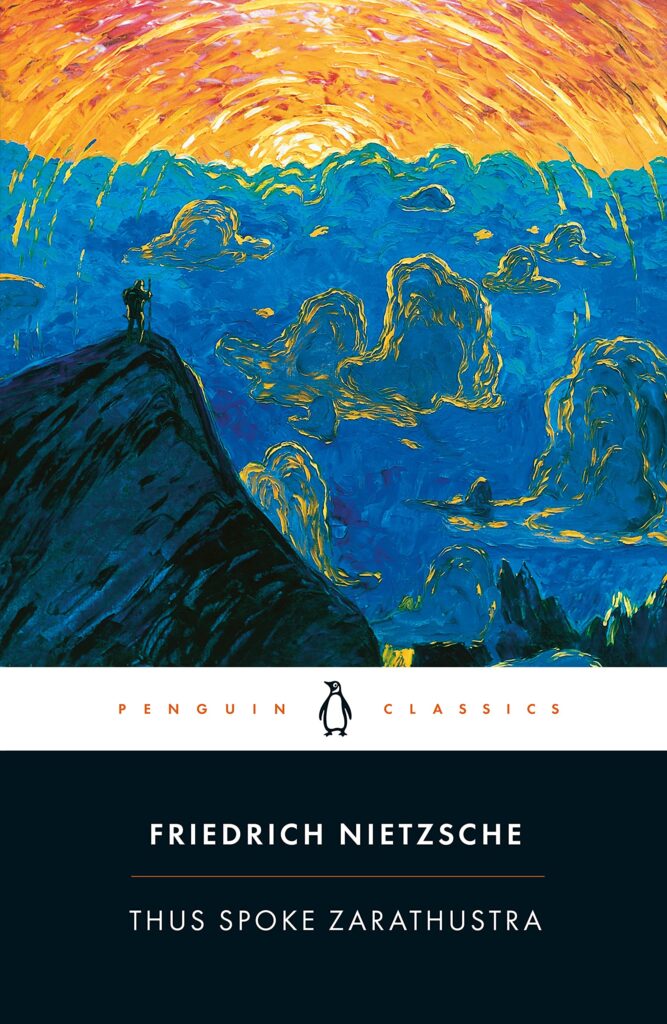
Thus Spoke Zarathustra is Friedrich Nietzsche’s most well-known and impactful philosophical work. It depicts the journey of the ancient Persian prophet, Zarathustra, who descends from his solitude in the mountains to proclaim the death of God and the emergence of the Superman as humanity’s successor. Nietzsche’s ideas, including his declaration of «God is dead», his belief that the meaning of life should be sought in human terms, and his concept of the Superman and the will to power, were later misunderstood and exploited by Nazi intellectuals and others.
Nietzsche presents his views with fierce intensity and poetic brilliance, asserting that the meaning of life cannot be found through religious piety or submission to authority, but instead lies in a powerful life force, characterized by passion, chaos, and freedom.
Beyond Good and Evil (1886)

Beyond Good and Evil, one of Friedrich Nietzsche’s most influential works, cemented his status as the leading philosopher of his time. In this ground-breaking piece of literature, Nietzsche challenges the long-standing Western traditions of truth, God, good and evil, and exposes the flawed morality within Christianity. With his characteristic wit and enthusiasm, he presents a philosophy that emphasizes the importance of embracing the present moment and taking control of one’s own life through the exercise of the ‘will to power’.
On the Genealogy of Morals
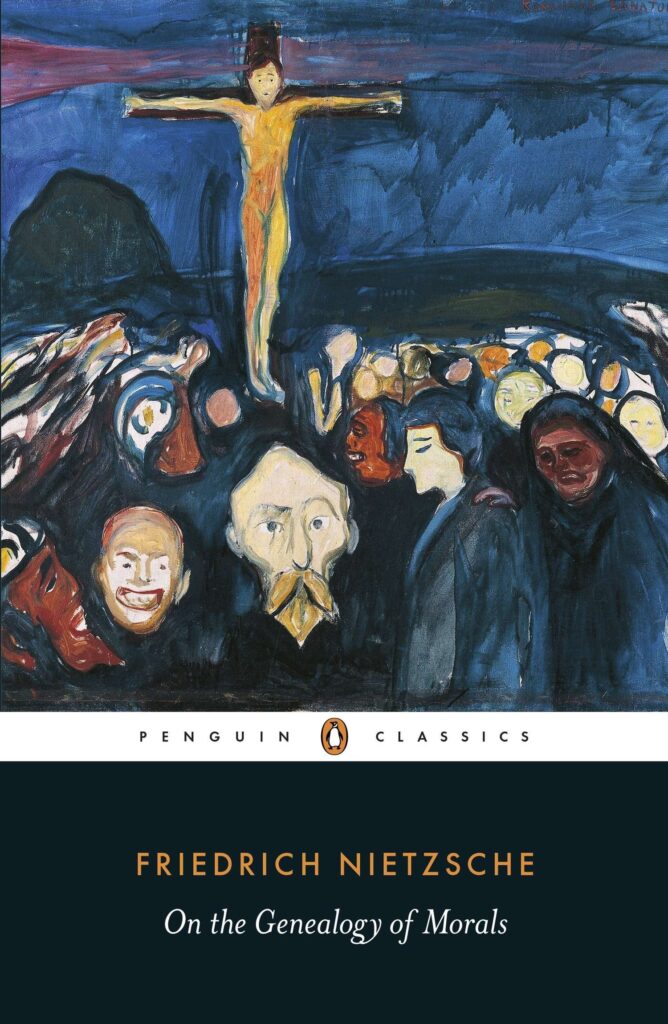
«On the Genealogy of Morals» by Friedrich Nietzsche is a highly regarded philosophical work that provides a deeper insight into his previous writing and thoughts. The book serves as an extension to «Beyond Good and Evil» by clarifying and elaborating the often cryptic aphorisms found in it.
In this work, Nietzsche presents a comprehensive and coherent examination of morality that is more approachable and easier to understand compared to his other writings. With its clear and straightforward language, «On the Genealogy of Morals» is a valuable addition to anyone’s study of Nietzsche’s philosophy.
Twilight of the Idols: or How to Philosophize with a Hammer

In «Twilight of the Idols,» Nietzsche casts a critical eye on contemporary German culture, labeling it as lacking sophistication and characterized by nihilism. He also takes aim at several prominent cultural figures in France, Britain, and Italy, who he sees as embodying similar traits. Instead, Nietzsche extols the virtues of historical figures such as Caesar, Napoleon, Goethe, Thucydides, and the Sophists, who he views as stronger and more vital representatives of culture.
The book outlines Nietzsche’s ultimate goal of the transvaluation of all values, and offers a unique perspective on the ancient world, where the Romans are given priority over the Greeks for once.
The Anti-Christ
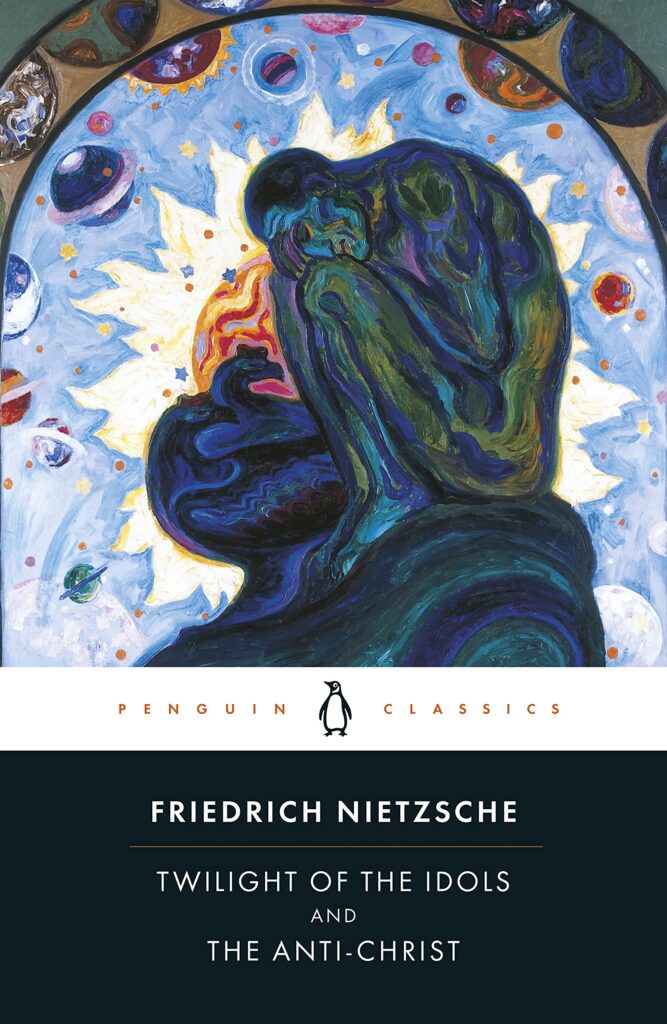
The Antichrist» is the clearest, most forceful and powerful expression of Friedrich Nietzsche’s late thought. It was the first manuscript to suffer the tampering and mutilation carried out by Elisabeth Förster-Nietzsche, Nietzsche’s sister. The text offered here, restored, corrects all of those manipulations and returns the pages that resulted in the quintessence of the philosopher’s final and great work, «The Will to Power» or «Transvaluation of all Values,» in which he advocates the overcoming of nihilism and Christianity. This edition also includes Twilight of the Idols.
Ecce Homo (1888)

In the late months of 1888, just before his descent into madness, Friedrich Nietzsche began to pen his autobiography, and the result was «Ecce Homo,» a unique and captivating example of the genre. The book is a journey through Nietzsche’s life, chronicling his evolution as a philosopher and his relationship with significant figures such as Schopenhauer, Wagner, Socrates, and Christ.
In «Ecce Homo,» Nietzsche also reflects on the impact of his philosophy and the significance of his «forthcoming revelation of all values.» The text is a mixture of self-aggrandizement and self-deprecation, offering a fascinating and at times bewildering glimpse into the mind of the philosopher.
Overall, «Ecce Homo» serves as Nietzsche’s final declaration of his beliefs and represents his last testament to the world.



